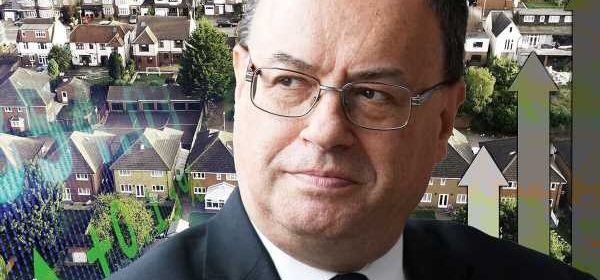Bank of England to cause mortgage hell as interest rates to soar to 13-year high

Interest rates: Expert advises on savings and mortgages
We use your sign-up to provide content in ways you’ve consented to and to improve our understanding of you. This may include adverts from us and 3rd parties based on our understanding. You can unsubscribe at any time. More info
A rise in the base rate on Thursday to one percent would take interest rates to levels not seen since February 2009. The continued rise in interest rates poses major question marks for the millions of homeowners who have bought at rock bottom rates in recent years. For most of 2020 and 2021 the base rate stood at 0.1 percent seeing mortgages sold with sub-one percent interest rates. However, those who took out such deals on a two year fix could be in for a shock in the coming months and years as they revert to variable rates amid a rising bank rate.
Karen Noye, mortgage expert at Quilter, explained while many mortgage holders had opted for five year fixes they would still need to be mindful of much higher rates when they end.
“If you’re coming off a rate between one and two percent where you are locked in a five year deal and all of a sudden we’re looking at continuous gradual rate increases there’s going to be quite an impact for those people when they come to re-mortgage.”
According to Ms Noye many lenders have already begun removing cheaper deals in recent days in anticipation of a hike next week.
While most analysts are predicting a rise to one percent next week, the long term outlook is less clear though some predictions have suggested interest rates could reach as high as three percent next year.


Such an increase would take the base rate to levels not seen since the financial crisis and pile greater borrowing costs on current holders used to historically low rates.
Ms Noye said: “Say we use a mortgage of £250k over a 25 year term at the current base rate, 0.75, you’d be looking at monthly payments in the region of £913.61 per month.
“Now if that 0.75 then went up to 1.75 that monthly payment then would be £1028.02 a month.
“And then again if that 1.75 then went to 2.75 then you’re looking at a monthly payment of £1150.73.”
For those on standard variable rates and trackers such increases would quickly begin being felt in monthly repayments, which could prove problematic given the current strains from a rising cost of living.
Sue Anderson of debt charity StepChange warned rising interest rates could begin putting greater pressure on those with debts, particularly mortgages.

She told Express.co.uk: “Where this becomes more interesting and more worrying is we might see a more direct impact on people paying their bills perhaps in the mortgage market, where homeowners have not been the highest proportion of our clients for some time… clearly they could see the most direct transmission between a rise in interest rates and a likely rise against their housing costs.”
“So I think that’s the area that we need to be watching most carefully to see if it does put more pressure on homeowners.”
While raising the base rate in theory impacts a wide range of borrowing Ms Anderson explained many of those with high levels of debt were typically already on high interest rates meaning the impact would be less obvious here compared to mortgages.
She suggested inflation remained the biggest issue to these households with the rising costs of essential spending leaving the poorest households with little money left over.
One area in which the Government could help is in its own approach to debt collection.
DON’T MISS:
German inflation refuses to fall as 40 year high reached [SPOTLIGHT]
Putin oil block sparks price surge with Europe recession fears [INSIGHT]
Putin’s ruble surges to 2-year high against euro [ANALYSIS]

According to Ms Anderson, while financial firms became good at handling and renegotiating debt during the pandemic, Government handling of debt can be more problematic with council tax arrears proving the most common form of debt.
More sensitive handling here, she suggested, could “reduce stress and burden” for the poorest households, particularly given the common use of bailiffs for Government debt.
With both the cost of borrowing and cost of living rising fast, the future also looks uncertain for the UK’s housing market which in recent years has enjoyed record growth.
Ms Noye said: “I do think it will cool down.
“It’s surprising really that it hasn’t cooled down as much as it has with everything that we’ve had going on, it’s crazy.”
So far high levels of demand have been met by an acute supply shortage with many houses going for above asking price as buyers compete with each other.
Stretched budgets and less borrowing capacity however could end up slowing this momentum.
Source: Read Full Article
